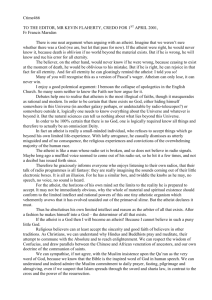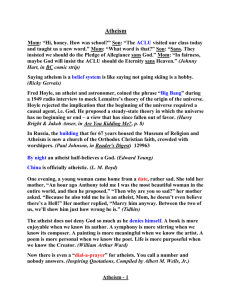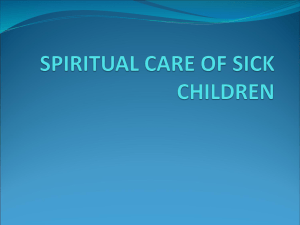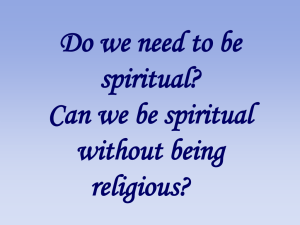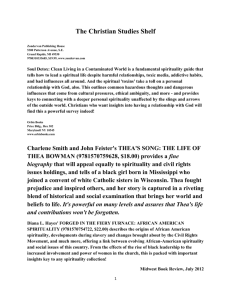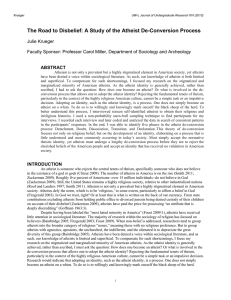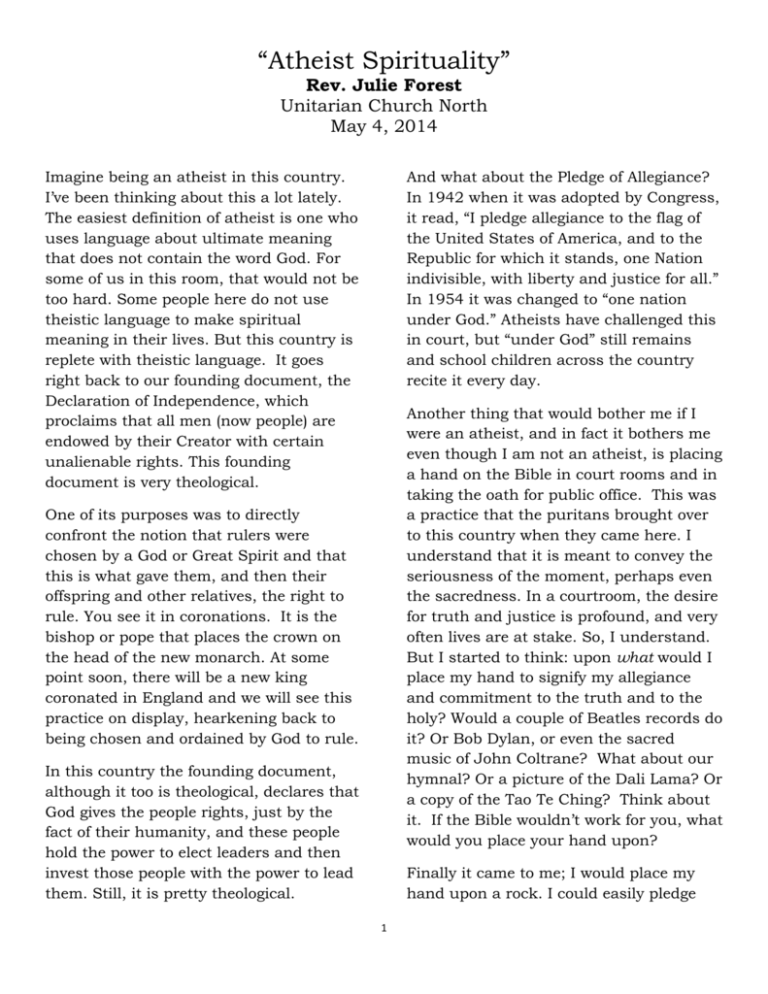
“Atheist Spirituality”
Rev. Julie Forest
Unitarian Church North
May 4, 2014
Imagine being an atheist in this country.
I’ve been thinking about this a lot lately.
The easiest definition of atheist is one who
uses language about ultimate meaning
that does not contain the word God. For
some of us in this room, that would not be
too hard. Some people here do not use
theistic language to make spiritual
meaning in their lives. But this country is
replete with theistic language. It goes
right back to our founding document, the
Declaration of Independence, which
proclaims that all men (now people) are
endowed by their Creator with certain
unalienable rights. This founding
document is very theological.
And what about the Pledge of Allegiance?
In 1942 when it was adopted by Congress,
it read, “I pledge allegiance to the flag of
the United States of America, and to the
Republic for which it stands, one Nation
indivisible, with liberty and justice for all.”
In 1954 it was changed to “one nation
under God.” Atheists have challenged this
in court, but “under God” still remains
and school children across the country
recite it every day.
Another thing that would bother me if I
were an atheist, and in fact it bothers me
even though I am not an atheist, is placing
a hand on the Bible in court rooms and in
taking the oath for public office. This was
a practice that the puritans brought over
to this country when they came here. I
understand that it is meant to convey the
seriousness of the moment, perhaps even
the sacredness. In a courtroom, the desire
for truth and justice is profound, and very
often lives are at stake. So, I understand.
But I started to think: upon what would I
place my hand to signify my allegiance
and commitment to the truth and to the
holy? Would a couple of Beatles records do
it? Or Bob Dylan, or even the sacred
music of John Coltrane? What about our
hymnal? Or a picture of the Dali Lama? Or
a copy of the Tao Te Ching? Think about
it. If the Bible wouldn’t work for you, what
would you place your hand upon?
One of its purposes was to directly
confront the notion that rulers were
chosen by a God or Great Spirit and that
this is what gave them, and then their
offspring and other relatives, the right to
rule. You see it in coronations. It is the
bishop or pope that places the crown on
the head of the new monarch. At some
point soon, there will be a new king
coronated in England and we will see this
practice on display, hearkening back to
being chosen and ordained by God to rule.
In this country the founding document,
although it too is theological, declares that
God gives the people rights, just by the
fact of their humanity, and these people
hold the power to elect leaders and then
invest those people with the power to lead
them. Still, it is pretty theological.
Finally it came to me; I would place my
hand upon a rock. I could easily pledge
1
my fealty and my loyalty and commitment
to Earth. But, I’m not sure our court
system has evolved to that point yet.
atheist perspective. Can there be an
atheist spirituality? Why not? Who owns
the human life of the spirit? This is a
question more and more people are
asking.
When people think of religion, often they
associate it with dogma, fundamentalism
and even fanaticism. They do this often
because it seems like the folks with the
loudest voices in the conversation don’t
speak about spirituality and the
ambiguities of faith; they speak or shout
with absolute conviction. This is not just
true in many of the major organized
religions; it is also true of some atheist
organizations. But it is not true for us as
Unitarian Universalists. We can be
religious and spiritual. We are religious
with practices and commitments, and at
the same time we are open to the spirit
and spiritual experiences found in nature,
music, community, meditation, prayer and
scripture. As we like to say: one light
many windows.
I’ve also heard people say that just
because we don’t engage in petitionary
prayer to a well-defined omnipotent God,
that we are not really praying. The people
that pray that way don’t own the word
prayer or the right to create an absolute
definition of prayer. For us, prayer is a
centering, a clearing, a deep listening to
that still small voice within, and an
opening to gratitude. It is an intentional
openness to Spirit. This is available to
everyone regardless of whether one is
theist or atheist.
And it is important to remember that to be
atheist does not preclude you from being
religious. Some people are religious about
their atheism, or their diet, or their
money. Religions have defined sets of
beliefs that bind people together and that
bind all of one’s thoughts and actions with
the wider world. Atheists have some
beliefs that hold together their world view.
They do not believe in a God of comfort
when they suffer or grieve. They do not
believe in a hell or any kind of afterlife.
Like many Unitarian Universalists,
atheists believe the most important
questions do not concern what happens
when we die, but rather what happens in
how we live our lives right now. And more
and more atheists have begun to
articulate an atheist spirituality, which I
have found to be a wonderful complement
to my own spirituality.
For those of us who are not
interested in dogma but seek
enlightenment, freedom and the life
of the human spirit, we can be
theists, but we don’t need to be. We
can also approach the life of the
spirit from an atheist perspective.
Can there be an atheist spirituality?
Why not? Who owns the human life
of the spirit?
For those of us who are not interested in
dogma but seek enlightenment, freedom
and the life of the human spirit, we can be
theists, but we don’t need to be. We can
also approach the life of the spirit from an
The French author Andre Comte–Sponville
shared an Atheist approach to faith. For
2
many, the definition of faith is believing in
something that you can’t see or prove. An
atheistic approach to faith would be to
shift the word to its Latin root word fides.
An atheistic approach would be to have
fidelity to values, to a community and to a
history with a sense of gratitude,
commitment and attachment. Fidelity
requires responsibility. Another part of
fidelity is transmitting our values, what we
hold to be good and true and beautiful, to
our children -- not just our biological
children, but to all children. He also had a
wonderful understanding about
communion and how important it is. “To
commune is to share without dividing.”
factor in sharing the cake together would
go way up. That is the joy of communion,
the pleasure in communion and the
essence of communion, devoid of a theistic
or Christian ownership or copyright of the
experience. The cake is divided, but the
communal experience -- the sharing and
the joy and sense of connection -- is
magnified. I feel that same way about our
lemonade communion. It is not a theistic
communion at all. When we have our
lemonade communion we are coming
together to share our joy and to
participate in blessing the world. No one
religion owns the patent on any aspect of
the spiritual life.
This would include the word sacred. All
societies and all people hold certain things
to be sacred. Holding something sacred
does not need to imply theism. Humanity,
freedom and justice are not inherently
theistic or supernatural, but they are
sacred to many of us, meaning that at our
best and most moral we would be willing
to sacrifice much to strengthen them.
Holding something sacred also does not
need to require it to be in any way
supernatural. The supernatural
component or magical thinking is
something that many atheists find
unpalatable when in occurs in religious or
spiritual conversations.
For many, the definition of faith is
believing in something that you
can’t see or prove. An atheistic
approach to faith would be to shift
the word to its Latin root word fides.
An atheistic approach would be to
have fidelity to values, to a
community and to a history with a
sense of gratitude, commitment and
attachment.
Think about having some cake. Let’s say
you got a whole cake and it was your
favorite cake; for me it would be a carrot
cake with lots of white frosting. If it was
just you and the cake was not big, you
could have as much of it as you wanted -wouldn’t that be fun? But then think
about inviting 4 or 5 of your most favorite
people in the world to share in this small
cake with you. If you split it 6 ways, you
would have a smaller piece, but there is
an excellent chance that your enjoyment
Personally, I do not believe many of the
supernatural claims made by religious
traditions from the Roman Catholics, to
the Voo Doo practitioners, or Muslims. At
the same time I accept the importance of
what I call trans rationalism. Not
everything that happens in my life makes
sense, nor can it all be explained. I am
comfortable with the knowledge that there
3
are so many things I don’t know and that
there is ever unfolding mystery.
Some people think that religion is crucial
because they believe that religion is the
basis for morals. And by that, many
people think that the most compelling
reason not to steal or kill or commit other
acts of violence is because of divine
retribution.
People that believe in the supernatural
don’t bother me, and in one way, I too find
myself being just a wee bit superstitious. I
know on one level how silly it is to wear
special clothes when the Packers play, and
I still do it. Even so, I am also completely
clear that I would not want to be governed
by folks whose values came primarily from
things that could be defined as
supernatural. The commitment to reason,
and not supernatural claims, is one of
atheism’s most cherished values when it
comes to the separation of church and
state.
Whether you have religion or not, nothing
can exempt you from having to respect the
lives, freedom and dignity of other people.
It is not religion that makes love superior
to hatred, generosity more healthy than
egoism, and justice more worthy than
injustice. Religion may help us
understand these values, but does not
have a monopoly on them.
I have an atheist joke for you.
Some people think that religion is
crucial because they believe that
religion is the basis for morals. And
by that, many people think that the
most compelling reason not to steal
or kill or commit other acts of
violence is because of divine
retribution.
Two rabbis are having dinner
together. They are close friends;
they can tell each other anything.
All night long they discussed the
existence of God and eventually
come to the conclusion that God
does not exist. At last they go off to
bed. In the morning, one of the
rabbis gets up, looks for his friend
all over the house, doesn't find him,
goes to look for him outside ― and
finds him in the garden, absorbed in
his ritual morning prayers.
Whether you have religion or not,
nothing can exempt you from having
to respect the lives, freedom and
dignity of other people. It is not
religion that makes love superior to
hatred, generosity more healthy
than egoism, and justice more
worthy than injustice. Religion may
help us understand these values,
but does not have a monopoly on
them.
Surprised, he says, "Hey! What are
you doing?"
"You can see for yourself ― I'm
saying my ritual morning prayers."
"That's just what surprises me! We
talked halfway through the night.
We decided that God did not exist,
and here you are saying your ritual
morning prayers?"
4
The other rabbi replies, quite
simply, "What does God have to do
with it?"
to incandescence. The face of the Hispanic guy
in a ripped black sweatshirt glowed with
health,
and I could tell that the sulking white girl
accompanied by her mother was brimming
with secret excitement to be getting her first
license,
already speeding down the highway, alone,
with all the windows open, singing.
And I think that is a wonderful question
for today. Just like in any other religious
tradition, there are new thoughts or new
ways of looking at atheism and today we
look at how one can be an atheist and be
a spiritual being. I love the atheistic
concepts of fidelity and communion. I
think the Jeffrey Harrison poem “Renewal”
is an excellent example of this:
This non-theistic way of looking at the
spirituality of things is available to all of
us, theists or non-theists. The key lies in
how we look at and interpret life.
At the Department of Motor Vehicles
to renew my driver’s license, I had to wait
two hours on one of those wooden benches
like pews in the Church of Latter Day
Meaninglessness, where there is no
stained glass (no windows at all, in fact),
no incense other than stale cigarette smoke
emanating from the clothes of those around me,
and no sermon, just an automated female voice
calling numbers over a loudspeaker.
And one by one the members of our sorry
congregation shuffled meekly up to the pitted
altar to have our vision tested or to seek
redemption for whatever wrong turn we’d
taken, or pay indulgences, or else be turned
away as unworthy of piloting our own journey.
Over the course of my life, my concepts of
God and my understandings of God have
shifted and changed considerably. Often I
define God as a spiritual feeling of
interconnectedness or as vibrations
coming from the great tuning fork. So
when Brian Wilson sings “Good
Vibrations,” it feels holy or God-ish from
both a sonic perspective and in defining
God as akin to a good vibration or a
tuning folk that I use to tune myself to.
The Dalai Lama, when asked what
surprised him most about humanity,
answered that man did. Because he
sacrifices his health in order to make
money. Then he sacrifices money to
recuperate his health. And then he is so
anxious about the future that he does not
enjoy the present; the result being that he
does not live in the present or the future;
he lives as if he is never going to die, and
then dies having never really lived.
This poem reminds us that we do not need
a concept of God or theism to make life
meaningful. Simple things like going to the
DMV are not in and of themselves
meaningful or sacred, but if we know
where to look, if we know how to interpret,
if we realize that we are the meaningmakers, a whole different picture emerges.
Now one might wonder why I am using a
quote from a world renowned religious
leader in a sermon about atheist
spirituality, and there are several reasons.
Pausing to look around, I used my numbered
ticket as a bookmark, and it was as if the dim
fluorescent light had been transformed
5
First, like Unitarian Universalism,
Buddhism does not require theism to
work. When asked whether there was or
was not a God, the Buddha never gave a
definitive answer, in part because he
thought that it was the wrong question to
be asking. One of the living embodiments
of Buddhism points us toward what one of
the right questions might be. One does not
need to be a theist to understand the
truth about this message from the Dalai
Lama. It is a spiritual concern that
touches on how we live our lives in the
present moment.
Don’t we all have the power to seek and
search?
Don’t we all have the power to create?
Don’t we all have the power to love?
Don’t we all have the power to appreciate
and participate? Don’t we all have the
power to connect with being, both our own
and each other’s?
Blessed Be. Amen.
Copyright 2014 Rev. Julie Forest. All Rights Reserved.
Like Unitarian Universalism,
Buddhism does not require theism
to work. When asked whether there
was or was not a God, the Buddha
never gave a definitive answer, in
part because he thought that it was
the wrong question to be asking.
Not all atheists certainly, but spiritual
atheists, don’t want to be discounted from
spiritual dialogues or to have their
spirituality disrespected because they
don’t use theistic language. And whether
we are theist or non-theist, we can
support their perspectives on the spiritual
life and perhaps even find some
nourishment in it as well. They take
strength and nourishment from
communion, fidelity, moral values and
principles which they hold to be sacred or
worth committing their lives to. How
would an atheist define spirituality? He or
she would define it as an inherent part of
being human.
6


